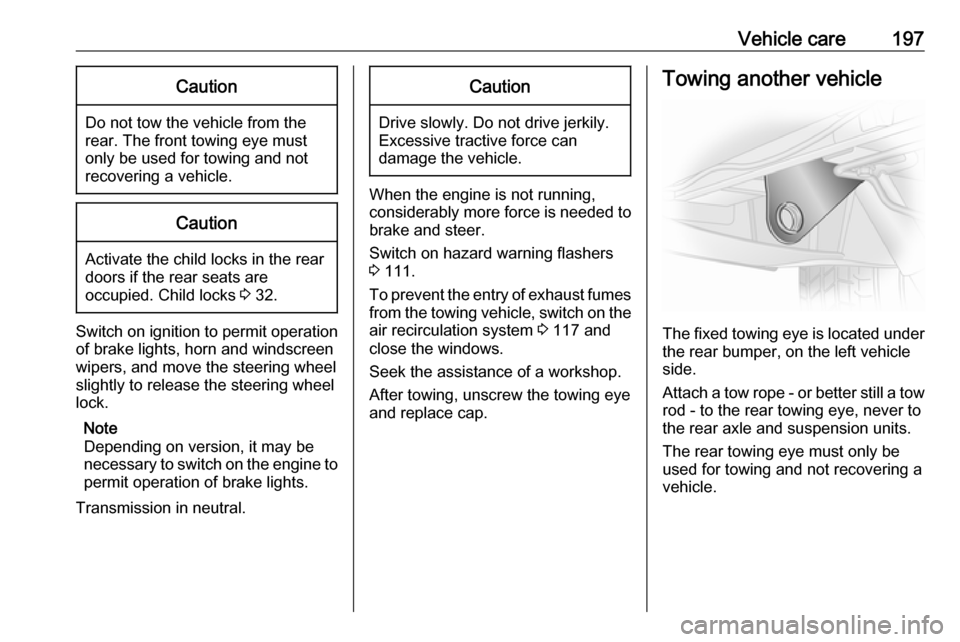ignition OPEL VIVARO B 2017.5 Manual user
[x] Cancel search | Manufacturer: OPEL, Model Year: 2017.5, Model line: VIVARO B, Model: OPEL VIVARO B 2017.5Pages: 233, PDF Size: 5.43 MB
Page 181 of 233

Vehicle care179Electrical system
Fuses Data on the replacement fuse must
match the data on the defective fuse.
There are two fuse boxes in the
vehicle:
● on the left-hand side of the instrument panel, behind the trim
panel
● in the engine compartment located next to the battery
Note
The engine compartment fuse box
should only be accessed by a
workshop.
Before replacing a fuse, turn off the
respective switch and the ignition.
There are different types of fuses in
the vehicle.
Depending on the type of fuse, a
blown fuse can be recognised by its
melted wire. Do not replace the fuse until the cause of the fault has been
remedied.
It is advisable to carry a full set of
fuses. Provision is made in the fuse
box for the storing of spare fuses.
Some functions are protected by
several fuses.
Fuses may also be inserted without existence of a function.
Note
Not all fuse box descriptions in this
Owner's Manual may apply to your
vehicle. Refer to the fuse box label,
where fitted.
Fuse extractor
Page 188 of 233

186Vehicle careTrailer towing
When towing a trailer with a fully
laden vehicle, the tyre pressure must
be increased by 20 kPa/0.2 bar
(3.0 psi) and the maximum speed
limited to 100 km/h.
Trailer towing 3 161.
Tyre pressure monitoring
system
The tyre pressure monitoring system
uses radio and sensor technology to
check tyre pressure levels.Caution
Tyre pressure monitoring system
warns only about low tyre pressure condition and does not replace
regular tyre maintenance by the
driver.
All wheels must be equipped with pressure sensors and the tyres must
have the prescribed pressure.
Note
In countries where the tyre pressure
monitoring system is legally
required, the use of wheels without
pressure sensors will invalidate the
vehicle type approval.
The tyre pressure monitoring system
sensors monitor the air pressure in
the tyres and transmit tyre pressure
readings to a receiver located in the
vehicle.
Tyre pressure chart 3 218.
Low tyre pressure conditionA detected low tyre pressure
condition is indicated by illumination
of control indicator w 3 100 and a
corresponding message appears in
the Driver Information Centre.
If w illuminates, stop as soon as
possible and inflate the tyres as
recommended 3 218.
After inflating, some driving may be
required to update the tyre pressure
values in the system. During this time
w may illuminate.
If w illuminates at lower temperatures
and extinguishes after some driving,
this could be an indicator for
approaching a low tyre pressure
condition. Check tyre pressure of all
four tyres.
If the tyre pressure must be reduced
or increased, switch off ignition.
Only mount wheels with pressure
sensors, otherwise w flashes for
several seconds then illuminates
continuously together with control
indicator F 3 98 and a corresponding
message appears in the Driver
Information Centre.
Page 189 of 233

Vehicle care187A spare wheel or temporary spare
wheel is not equipped with pressure
sensors. The tyre pressure
monitoring system is not operational
for these wheels. For the further three
wheels, the tyre pressure monitoring
system remains operational.
Control indicator w and the
corresponding message appears at
each ignition cycle until the tyres are
inflated to the correct tyre pressure.
Driver Information Centre 3 102.
Vehicle messages 3 103.
Puncture
A puncture or severely under-inflated
tyre is indicated by illumination of
control indicator w together with C
3 98 and a corresponding message
appears in the Driver Information
Centre. Stop vehicle and switch off
engine.
Tyre pressure 3 218.
Tyre repair kit 3 189.
Spare wheel 3 193.
Wheel changing 3 192.Relearn function
After a puncture has been repaired
and the driver has inflated the tyres to
the correct tyre pressure, the tyre
pressure monitoring system needs to recalculate.
Tyre pressure 3 218.
Tyre repair kit 3 189.
During driving, select the tyre
pressure menu in the Driver
Information Centre by pressing button
on end of wiper lever. Press and hold button for approx. five seconds to
initialise recalculation. A
corresponding message appears in
the Driver Information Centre.
Several minutes of driving at a speed above 40 km/h may be required to
complete the relearn process. The system can only provide limited
information during this time.
If problems occur during the relearn
process, control indicator w remains
illuminated and a warning message is displayed in the Driver Information
Centre.
Driver Information Centre 3 102.
Vehicle messages 3 103.
General information The use of tyre chains or
commercially available liquid tyre
repair kits can impair the function of
the system. Factory-approved tyre
repair kits can be used.
Tyre repair kit 3 189, Tyre chains
3 189.
External high-power radio equipment
could disrupt the tyre pressure
monitoring system.
Each time the tyres are replaced, the
tyre pressure monitoring system
sensors must be dismounted and
serviced by a workshop.
Page 199 of 233

Vehicle care197Caution
Do not tow the vehicle from the
rear. The front towing eye must
only be used for towing and not
recovering a vehicle.
Caution
Activate the child locks in the rear
doors if the rear seats are
occupied. Child locks 3 32.
Switch on ignition to permit operation
of brake lights, horn and windscreen
wipers, and move the steering wheel
slightly to release the steering wheel
lock.
Note
Depending on version, it may be
necessary to switch on the engine to
permit operation of brake lights.
Transmission in neutral.
Caution
Drive slowly. Do not drive jerkily.
Excessive tractive force can
damage the vehicle.
When the engine is not running,
considerably more force is needed to
brake and steer.
Switch on hazard warning flashers
3 111.
To prevent the entry of exhaust fumes
from the towing vehicle, switch on the air recirculation system 3 117 and
close the windows.
Seek the assistance of a workshop.
After towing, unscrew the towing eye
and replace cap.
Towing another vehicle
The fixed towing eye is located under the rear bumper, on the left vehicle
side.
Attach a tow rope - or better still a tow
rod - to the rear towing eye, never to
the rear axle and suspension units.
The rear towing eye must only be
used for towing and not recovering a
vehicle.
Page 224 of 233

222Customer information● vehicle reactions in particulardriving situations (e.g. inflation of
an airbag, activation of the
stability regulation system)
● environmental conditions (e.g. temperature)
These data are exclusively technical
and help identifying and correcting
errors as well as optimising vehicle
functions.
Motion profiles indicating travelled
routes cannot be created with these
data.
If services are used (e.g. repair
works, service processes, warranty cases, quality assurance),
employees of the service network
(manufacturer included) are able to
read out this technical information
from the event and error data storage
modules applying special diagnostic
devices. If required, you will receive
further information at these
workshops. After an error has been
corrected, the data are deleted from
the error storage module or they are
constantly overwritten.When using the vehicle, situations
may occur in which these technical
data related to other information
(accident report, damages on the
vehicle, witness statements etc.) may be associated with a specific person -possibly, with the assistance of an
expert.
Additional functions contractually
agreed upon with the client (e.g.
vehicle location in emergency cases)
allow the transmission of particular
vehicle data from the vehicle.
Radio Frequency
Identification (RFID)
RFID technology is used in some
vehicles for functions such as tyre
pressure monitoring and ignition
system security. It is also used in
connection with conveniences such
as radio remote controls for door
locking/unlocking and starting, and in-
vehicle transmitters for garage door
openers. RFID technology in Opel
vehicles does not use or record
personal information or link with any
other Opel system containing
personal information.
Page 228 of 233

226Exit lighting ................................ 114
Exterior care .............................. 198
Exterior light ............................... 101
Exterior lighting ....................14, 108
Exterior mirrors ............................. 40
F
Fault messages .......................... 103
First aid kit ................................... 82
Fixed air vents ........................... 127
Fog light ..................................... 101
Fog lights ............................ 111, 173
Fog tail light ............................... 177
Folding centre seatback ...............75
Folding front centre passenger seat ........................................... 50
Folding mirrors ............................. 41
Foot well lights ............................ 112
Front airbag system .....................62
Front courtesy lights ...................112
Front door pockets........................ 76
Front fog lights ....................108, 111
Front reading light....................... 113
Front seats.................................... 47
Front storage ................................ 75
Front turn signal lights ...............174
Fuel consumption - CO 2-
Emissions ............................... 160
Fuel cut-off system .....................134
Fuel economy gauge ....................93Fuel economy mode ...................101
Fuel economy rating ...........103, 105
Fuel for diesel engines ..............158
Fuel gauge ................................... 92
Fuel tank ..................................... 217
Fuse box ..................................... 180
Fuses ......................................... 179
G Gauges ......................................... 91
General information ...................160
Glovebox ..................................... 74
Glovebox cooler ......................... 127
Glove box lighting .......................114
Grab handles ................................ 78
H Hand brake ................................. 146
Hand brake - see Parking brake. 147
Hazard warning flashers ............111
Headlight flash ........................... 109
Headlight range adjustment ......109
Headlights .................. 108, 109, 173
Headlights when driving abroad 110
Head restraint adjustment .............8
Head restraints ............................ 46
Heated exterior mirrors .................17
Heated mirrors ............................. 41
Heated rear window ...............17, 45
Heating ........................................ 50
Heating and ventilation system . 116Heat-reflecting windscreen ...........43
High beam ......................... 101, 109
Hill start assist ........................... 147
Horn ....................................... 16, 85
I
Identification plate .....................206
Idle speed control .......................134
Ignition switch positions .............131
Immobiliser .................................. 40
Indicators ...................................... 91
Info display ................................. 102
Information displays.................... 102
Infotainment system ...................102
Initial drive information.................... 6
Instrument cluster ........................91
Instrument panel fuse box .........180
Instrument panel illumination .....178
Instrument panel illumination control .................................... 112
Instrument panel overview ........... 10
Instrument panel storage ..............73
Instrument panel tray ....................73
Interior care ............................... 200
Interior lighting ............................ 112
Interior lights ...................... 112, 178
Interior mirrors .............................. 42
Introduction .................................... 3
ISOFIX .......................................... 65